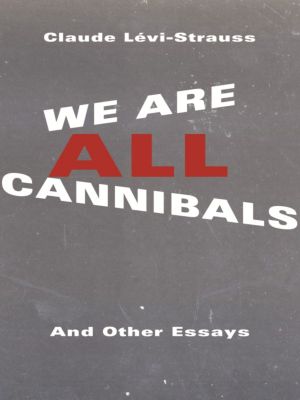We Are All Cannibals

- Authors
- Lévi-Strauss, Claude
- Publisher
- Columbia University Press
- Tags
- soc041000 , sociology , philosophy , social science , essays , soc002010 , anthropology , cultural , reference
- ISBN
- 9780231541268
- Date
- 2013-01-01T00:00:00+00:00
- Size
- 2.89 MB
- Lang
- en
On Christmas Eve 1951, Santa Claus was hanged and then publicly burned outside of the Cathedral of Dijon in France. That same decade, ethnologists began to study the indigenous cultures of central New Guinea, and found men and women affectionately consuming the flesh of the ones they loved. Everyone calls what is not their own custom barbarism," said Montaigne. In these essays, Claude Lvi-Strauss shows us behavior that is bizarre, shocking, and even revolting to outsiders but consistent with a people's culture and context.These essays relate meat eating to cannibalism, female circumcision to medically assisted reproduction, and mythic thought to scientific thought. They explore practices of incest and patriarchy, nature worship versus man-made material obsessions, the perceived threat of art in various cultures, and the innovations and limitations of secular thought. Lvi-Strauss measures the short distance between complex" and primitive"...
On Christmas Eve 1951, Santa Claus was hanged and then publicly burned outside of the Cathedral of Dijon in France. That same decade, ethnologists began to study the indigenous cultures of central New Guinea, and found men and women affectionately consuming the flesh of the ones they loved. “Everyone calls what is not their own custom barbarism,” said Montaigne. In these essays, Claude Lévi-Strauss shows us behavior that is bizarre, shocking, and even revolting to outsiders but consistent with a people’s culture and context. These essays relate meat eating to cannibalism, female circumcision to medically assisted reproduction, and mythic thought to scientific thought. They explore practices of incest and patriarchy, nature worship versus man-made material obsessions, the perceived threat of art in various cultures, and the innovations and limitations of secular thought. Lévi-Strauss measures the short distance between “complex” and “primitive” societies and finds a shared madness in the ways we enact myth, ritual, and custom. Yet he also locates a pure and persistent ethics that connects the center of Western civilization to far-flung societies and forces a reckoning with outmoded ideas of morality and reason.
On Christmas Eve 1951, Santa Claus was hanged and then publicly burned outside of the Cathedral of Dijon in France. That same decade, ethnologists began to study the indigenous cultures of central New Guinea, and found men and women affectionately consuming the flesh of the ones they loved. Everyone calls what is not their own custom barbarism, said Montaigne. In these essays, Claude L�vi-Strauss shows us behavior that is bizarre, shocking, and even revolting to outsiders but consistent with a people's culture and context.
These essays relate meat eating to cannibalism, female circumcision to medically assisted reproduction, and mythic thought to scientific thought. They explore practices of incest and patriarchy, nature worship versus man-made material obsessions, the perceived threat of art in various cultures, and the innovations and limitations of secular thought. L�vi-Strauss measures the short distance between complex and primitive societies and finds a shared madness in the ways we enact myth, ritual, and custom. Yet he also locates a pure and persistent ethics that connects the center of Western civilization to far-flung societies and forces a reckoning with outmoded ideas of morality and reason.--Julia Kristeva "Kirkus Reviews"